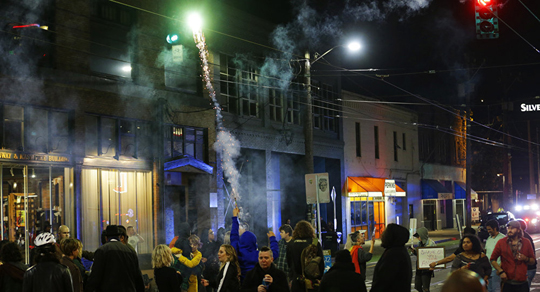Washington, Nov 10: The Seattle police said on Wednesday night that they were investigating a report of a shooting with “multiple victims” not far from the scene of protests over the surprise victory of Republican Donald Trump in the U.S. presidential election.

The Seattle fire department said on Twitter shortly after 7 p.m. local time that some crew were treating five patients with gunshot wounds, two of them with life-threatening injuries.
It was not immediately clear if the shooting was related to the demonstrations.
Police said on Twitter that more details would be released “as they become available.”
Local KIRO-TV reported that the suspect remained at large following the shooting.
'Not my president!'
The raw divisions exposed by the presidential race were on full display across America, as protesters flooded city streets to condemn Donald Trump's election.
From New England to heartland cities like Kansas City and along the West Coast, demonstrators carried flags and anti-Trump signs, disrupting traffic and declaring that they refused to accept Mr. Trump's triumph.
In Chicago, where thousands had recently poured into the streets to celebrate the Chicago Cubs' first World Series victory in over a century, several thousand people marched through the Loop. They gathered outside Trump Tower, chanting “Not my president!”
A similar protest in Manhattan drew about 1,000 people. Outside Trump Tower on Fifth Avenue in midtown, police installed barricades to keep the demonstrators at bay.
In Boston, thousands of anti-Trump protesters streamed through downtown, chanting “Trump's a racist” and carrying signs that said “Impeach Trump” and “Abolish Electoral College.” Clinton appears to be on pace to win the popular vote, despite losing the electoral count that decides the presidential race.
In Oregon, dozens of people blocked traffic in downtown Portland, burned American flags and forced a delay for trains on two light-rail lines. Earlier, the protest in downtown drew several Trump supporters, who taunted the demonstrators with signs. A lone Trump supporter was chased across Pioneer Courthouse Square and hit in the back with a skateboard before others intervened.
The only major violence was reported in Oakland, California, during a protest that began shortly before midnight and lasted into early Wednesday morning.
Back in New York, several groups of protesters caused massive gridlock as police mobilized to contain them under a light rain. They held signs that read “Trump Makes America Hate” and chanted “hey, hey, ho, ho Donald Trump has got to go.” and “Impeach Trump.”





Comments
Add new comment